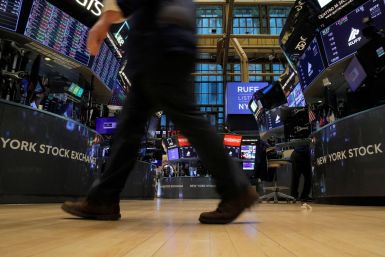Oil prices gained for a fourth straight session on Wednesday as data showed a drawdown in U.S.
Oil prices slid about 2% on Wednesday as a rise in U.S.
Japanese retail sales rose for a third straight month in May, reinforcing views that strong consumption will lead an economic rebound this quarter, although rising inflation poses a risk to household spending for the rest of 2022.
The Bank of Japan will maintain its ultra-loose monetary policy as the economy has not been affected much by the global inflationary trend, Governor Haruhiko Kuroda said, stressing the country's 15-year experience with deflation is keeping wage growth subdued.
Issuers of bonds that raise cash for "green" projects should voluntarily apply industry standards to avoid hoodwinking investors, Britain's Financial Conduct Authority (FCA) said on Wednesday.
The United States on Tuesday imposed sanctions on over 100 targets and banned the import of new Russian gold, increasing pressure on Russia following its invasion of Ukraine in line with commitments made by the G7 this week.
A senior official at the World Bank has ramped up its calls for changes in sovereign debt laws so governments have more control when crises strike and they have to restructure their debt.
Travel and leisure shares propped up U.S. stock index futures after China relaxed some COVID-19 quarantine requirements for international travelers, raising hopes of a revival in global growth.
Travel and leisure shares positioned U.S. stock indexes for a higher open on Tuesday after China relaxed some COVID-19 quarantine requirements for international travelers, raising hopes of a revival in global growth.
Wall Street's main indexes tumbled in midday trading on Tuesday as a sharp drop in consumer confidence brought to the fore growth risks from rising inflation.
Bank shares boosted the Dow Jones and the S&P 500 indexes on Tuesday as the big four lenders raised dividends following a stress test, but a sharp drop in consumer confidence brought to fore the risks from rising inflation.
Wall Street tumbled in a broad sell-off on Tuesday as dire consumer confidence data dampened investor optimism and fueled worries that the Federal Reserve's aggressive battle against inflation could tip the economy into recession.
Wall Street slid on Tuesday with early gains reversing to a broad sell-off on the heels of dire consumer confidence data, which dampened investor optimism and stoked recession fears.
India is considering allowing mills to ship out stocks of raw sugar that have piled up in ports and warehouses, trade and government sources said on Tuesday, weeks after it imposed curbs on overseas sale of the sweetener.
Big Four accounting firm Ernst & Young will pay $100 million to settle U.S.
Eric Broten had planned to sow about 5,000 acres of corn this year on his farm in North Dakota, but persistent springtime rains limited him to just 3,500 in a state where a quarter or more of the planned corn could remain unsown this year.
European shares rose on Tuesday, led by commodity-linked stocks and automakers after China relaxed its COVID-19 quarantine mandate, with investors eyeing the European Central Bank's (ECB) annual forum for clues on monetary policies.
European shares rose on Tuesday as risk appetite improved after China eased its COVID-19 quarantine mandate, while rising oil prices provided an additional boost to energy stocks.
Britons are shifting to cheaper food alternatives in their supermarket shopping as they try to navigate a worsening cost of living crisis, industry data showed on Tuesday.
The Group of Seven economic powers have agreed to explore imposing a ban on transporting Russian oil that has been sold above a certain price, they said on Tuesday.
The Group of Seven economic powers have agreed to explore imposing a ban on transporting Russian oil that has been sold above a certain price, they said on Tuesday, aiming to deplete Moscow's war chest.
The European Central Bank will likely drain cash from the banking system to offset any bond purchases made to cap borrowing costs for indebted euro zone states, two sources told Reuters.
Pakistan said on Tuesday that it has received economic and financial targets from the International Monetary Fund (IMF) that once agreed and ratified should pave the way for multilateral lender to unlock a suspended bailout programme.
Global shares moved into positive territory on Tuesday while oil prices firmed following China's decision to ease some quarantine requirements for international arrivals that raised hopes for stronger growth and a revival in demand for commodities.
Global shares were higher on Tuesday while oil prices firmed following China's decision to ease some quarantine requirements for international arrivals that raised hopes for stronger growth and a revival in demand for commodities.
Stocks on global indexes were lower on Tuesday following a drop in June U.S. consumer confidence, while oil prices gained for a third day.
Stocks on global indexes fell sharply on Tuesday, with the S&P 500 down 2% after a report showed U.S.
The euro won support on Tuesday as traders braced for European inflation figures to run hot this week and awaited a speech from central bank chief Christine Lagarde, while worries about a recession kept the U.S.
The euro held onto its recent gains on Tuesday ahead of European inflation figures this week that are expected to run hot and a speech from central bank chief Christine Lagarde, while a rally in oil prices boosted commodity currencies.
The Aussie and the Canadian dollar climbed on Tuesday on firmer oil prices while the euro held below $1.06 as European Central Bank (ECB) President Christine Lagarde offered no fresh insight on the central bank's policy outlook.



































